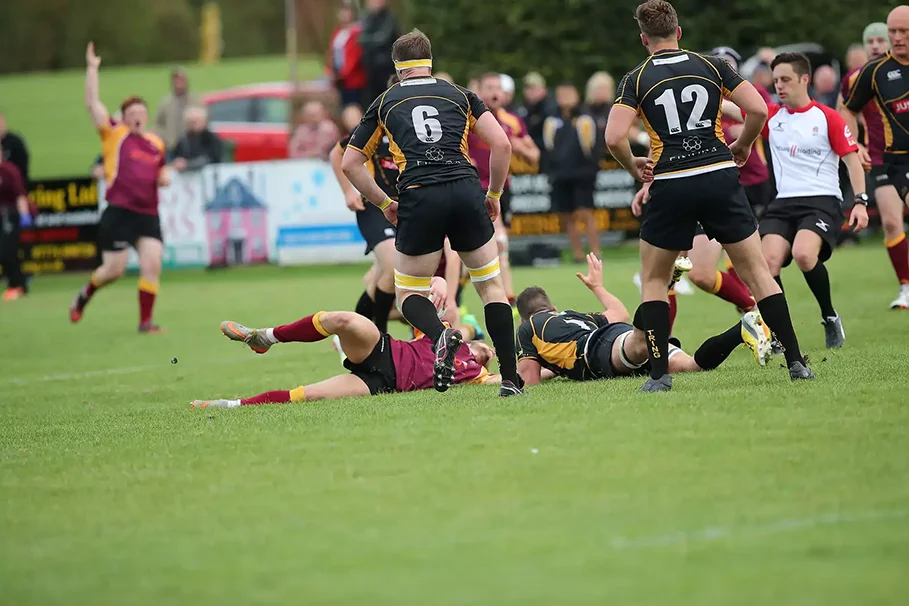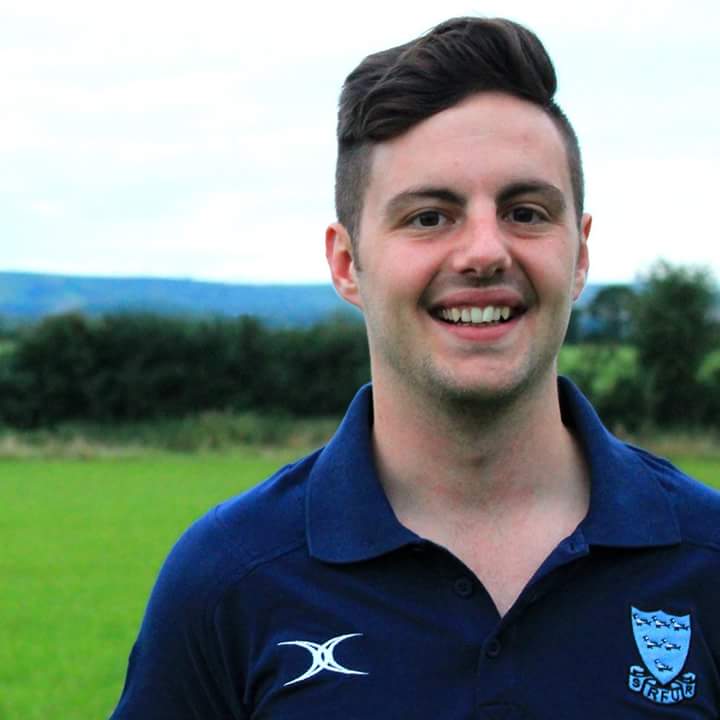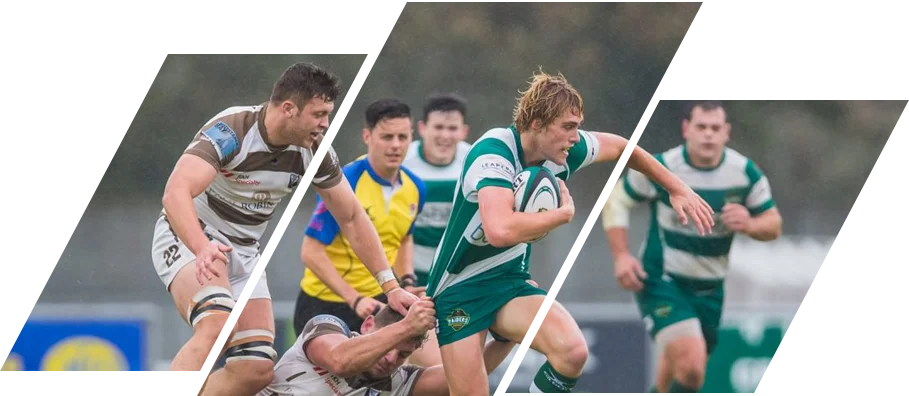Referee Analysis in Rugby
Ben McNamara talks about his passion for being a Sussex Society of RFU Referee. Ben has been fortunate enough to referee in the national leagues and talks about the use and advantages of referee analysis and how it helps referees make better decisions.
Why did you choose to become a referee?
I played rugby from the age of eight, but eventually the risk/reward balance became too great as a result of a couple of unlucky injuries. I bumped into an RFU stand advertising refereeing at a ‘clubs and socs’ fair, while I was studying at Durham Uni., and I thought I would give it a go!
Since then, I joined the Sussex Society of RFU Referees and have been fortunate enough to progress up the levels to referee in the national leagues.
What is analysis for a rugby referee?
Referee analysis changes as you go through the levels. But at its most basic, it starts and finishes with the individual (i.e. the referee). When you are in the middle of the game, you don’t have someone else there to make the decision for you, so it is up to the referee to be prepared to stand by their call through developing a deep understanding of the game in their own time and for whichever level they are officiating.
You are often appointed a match assessor or an observer, who will analyse your performance as well and give you critical (but constructive) feedback, as will most Directors of Rugby.
The referee has a big individual responsibility to build upon performances from each game to make sure habits and behaviours enable them to perform appropriately in each scenario. You can’t have someone else make the decision for you, which would kind of defeat the point of being a referee, nor can you rely on someone else’s analysis all the time.

What does that analysis look at?
Is analysis just about reviewing what was a right or wrong decision?
Well, anyone can sit at home and make a judgement call about a decision (or non-decision), but analysis for a referee is not just a set of numbers, or simply making things black-and-white (i.e. ‘was that the right call?’), but it is understanding why situations happened, how one responded as a referee, and whether the situation could (or should) have been different.
At the forefront of this analysis, however, is ensuring that as referees we are allowing the game to be decided by the players. It sounds odd, but being a referee is not about demonstrating how ‘officious’ one is with the Laws, or about being as ‘visible’ as possible. It is, rather, about enabling the players to play the game.
If we take something like a referee’s positioning on the filed as an example of one of the things a referee might analyse post-match, we can ask two basic questions of the referee:
- Was the referee in the right place, at the right time, to make a critical decision (e.g. to see a try, or an offence at the ruck)?
- Did the referee get in the way of players/the ball, which had an adverse effect on play?
Now, simply having a high score on a fitness test doesn’t give any insight into the above, nor does just answering these questions with a simple yes/no tick in a box. Rather, what lay behind these questions is the more important point about whether the referee’s general positioning demonstrates a good reading of the game, through which they can be in the best place to make a decision.
Tracking the referee and noting where they are in relation to the different phases of play as they occur, and how they got into certain positions on the field of play, helps to create a picture that answers the questions above. This kind of analysis is not limited to positioning only, but it highlights that managing a game of rugby requires game understanding and being able to interpret what is occurring in real-time. As mentioned above, it is about knowing when the referee needs to step in and ‘get involved’ with a key decision or active management of players, and when doing so would be disruptive and unnecessary.
Analysis in this case, therefore, is about looking at different scenarios, how situations occur, and what the referee will do (or not do) about it.
Knowing the Laws of the Game is crucial for a referee (obviously!). Coupled with this, however, is the necessity to understand how to apply these laws in the context of what is happening on the pitch. For example, the speed of the game, skill level, fitness/age of players, context (if in a league or pre-season friendly) etc., are just some variables that change depending on the level of the fixture. The laws don’t change, but how one manages players and applies the laws may do.
Improve your team's performance
Get insights, get winning
Sign up now and get started
What is your process for self-analysis?
Preparation before the game is just as important as any post-match analysis that is done the week before, because one takes that experience and processes it to determine what will be needed for the next fixture, and the next, and so on.
For me, my review process goes through something like this through the week:
-
Pre-match preparation and research (e.g. what are the current league rankings going into the game? Is this a cup match or a friendly?)
-
Match day preparation (e.g. what is the team doing in their warm up? What have the coaches wanted to discuss?)
-
Half-time thought process (Snapshot analysis of the first half: what trends are there, if any? What could happen in the second half? What are my colleagues’ views?)
-
Post-match summary (debrief with refereeing advisor/coach)
-
Video footage if available (do complete self-review: what are three good/bad points?)
-
Assessor/observer report (re-watch footage in light of this)
-
After video review and reading assessor’s report, have discussion with referee coach/mentor
-
Discuss with team Directors of Rugby (only if appropriate)
-
Summarise takeaways /learning points from the above
-
Begin pre-match preparation and research for next game
You mention your ‘colleagues’ in the above, what do you mean by this?
Despite what I’ve said about the individual responsibility on the referee, there is a lot of teamwork involved. Referees who are committed and want to progress are appointed a coach, with whom they process and review matches, in order to help with development and progression. As well as this, there will be assistant referees who also give support, and from which the referee can draw upon their experience and input.
Local societies are a great place to review footage and develop as a referee. In them you will find lots of referees who are keen to help one-another and review each other’s footage while giving feedback on certain decisions. This is an important part of the analysis process, and you’d be surprised to learn that there is not always a consensus among referees about what a certain decision should be!
Thankfully these debates are really healthy, and demonstrate the level of mutual respect and genuine friendship among those of us who have decided to be ‘in the middle’. After all, we all just love rugby, and if we can help each other to develop game understanding and law application then all the better for the sport and the teams we officiate.
As well as this, having a community of referees helps when dealing with the pressure and stresses of being a referee. Each person develops their own style and ways of dealing with the challenges refereeing can bring, but this is where a referee society is really special. You support each other, learn from each other, and make friends for life outside of the game. What has been a pleasant surprise for me, since I started refereeing, is that you discover a lot about who you are as a person and what you can/can’t tolerate. This is where you go beyond referee analysis and turn it into self-reflection and development.
Despite what I’ve said about the individual responsibility on the referee, there is a lot of teamwork involved. Referees who are committed and want to progress are appointed a coach, with whom they process and review matches, in order to help with development and progression. As well as this, there will be assistant referees who also give support, and from which the referee can draw upon their experience and input.
Local societies are a great place to review footage and develop as a referee. In them you will find lots of referees who are keen to help one-another and review each other’s footage while giving feedback on certain decisions. This is an important part of the analysis process, and you’d be surprised to learn that there is not always a consensus among referees about what a certain decision should be!
Thankfully these debates are really healthy, and demonstrate the level of mutual respect and genuine friendship among those of us who have decided to be ‘in the middle’. After all, we all just love rugby, and if we can help each other to develop game understanding and law application then all the better for the sport and the teams we officiate.
As well as this, having a community of referees helps when dealing with the pressure and stresses of being a referee. Each person develops their own style and ways of dealing with the challenges refereeing can bring, but this is where a referee society is really special. You support each other, learn from each other, and make friends for life outside of the game. What has been a pleasant surprise for me, since I started refereeing, is that you discover a lot about who you are as a person and what you can/can’t tolerate. This is where you go beyond referee analysis and turn it into self-reflection and development.
Do you have any final thoughts?
Whether you are a coach, a former player, or just a fan who loves the game, refereeing brings lots of benefits that will give you a greater appreciation of the sport, while developing your own character in a way that will help in your personal life and in a professional setting.
You’ll also get to travel to new places and extend your network among rugby fans and people for whom this sport really is the best in the world.

Ben McNamara
Contributor
Ben is an amateur RFU Referee having joined the Sussex Society of RFU Referees in 2014. He currently is part of the South East Group Development Squad and officiates at National 3.
He also has his own blog: www.bmdmcnamara.com

